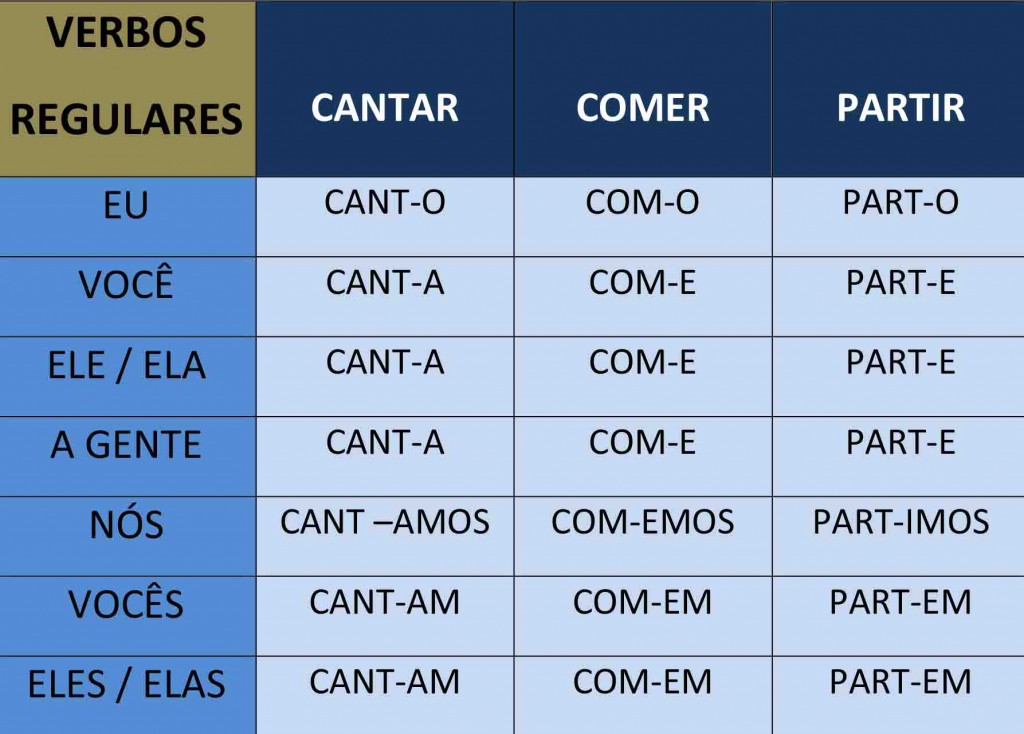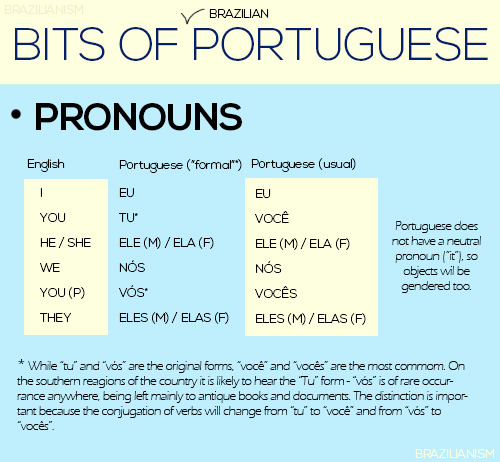
Present tense / Verbos – Presente do Indicativo
In Portuguese there are 3 different classes of verbs: verbs ending in
“ar”, verbs ending in
“er”, verbs ending in
“ir”. Each class of regular verbs has its own pattern of termination when conjugated.
When conjugating regular verbs in Portuguese you just have to preserve the root of the verb and substitute
“ar”, “er” or
“ir” for the following bold terminations:
|
Person |
Amar(to love) |
Comer(to eat) |
Abrir(to open) |
| Singular |
Eu |
amo |
como |
abro |
| Ele / Ela / Você A gente |
ama |
come |
abre |
| Plural |
Nós |
amamos |
comemos |
abrimos |
| Eles/ Elas/ Vocês |
amam |
comem |
abrem |
Examples:
- Eu amo. (I love.)
- Ela ama. (She loves)
- Ele ama. (He loves)
- Você ama. (You love)
- A gente ama. (We love)
- Nós amamos. (We love)
- Eles amam. (They love)
- Vocês amam. (You love)

Verbs ending in
“ir” having the vowel
“e” at the second-to-the-last syllable have the root changed when they are conjugated in the Present tense. The vowel
“e” is changed for
“i” just for the first person
“eu”. The other conjugations follow the same pattern that is presented above.
|
Person |
Vestir(to wear) |
Mentir(to lie) |
| Singular |
Eu |
visto |
minto |
| Ele / Ela / Você / A gente |
veste |
mente |
| Plural |
Nós |
vestimos |
mentimos |
| Eles/ Elas/ Vocês |
vestem |
mentem |
 Examples:
Examples:
- Eu minto. (I lie)
- Ela mente. (She lies)
- Ele mente. (He lies)
- Você mente. (You lie)
- A gente mente. (We lie)
- Nós mentimos. (We lie)
- Eles mentem. (They lie)
- Vocês mentem. (You lie)
Verbs ending in
“ir” having the vowel
“o” at the second-to-the-last syllable have the root changed when they are conjugated in the Present tense. The vowel
“o” is changed for
“u” just for the first person
“eu”.
|
Person |
Dormir(to sleep) |
Descobrir(to discover) |
| Singular |
Eu |
durmo |
descubro |
| Ele / Ela / Você / A gente |
dorme |
descobre |
| Plural |
Nós |
dormimos |
descobrimos |
| Eles/ Elas/ Vocês |
dormem |
descobrem |
Examples:
- Eu durmo cedo. (I sleep early)
- Ela dorme cedo. (She sleeps early)
- Ele dorme cedo.. (He sleeps early)
- Você dorme cedo.. (You sleep early)
- A gente dorme cedo.. (We sleep early)
- Nós dormimos cedo.. (We sleep early)
- Eles dormem cedo.. (They sleep early)
- Vocês dormem cedo.. (You sleep early)
Portuguese:Regular verbs
Regular verbs have a invariable radical (fal
ar – to speak) and are easy to memorize. Each conjugation follows a different, but regular pattern.
-ar present tense regular verbs
All regular verbs ending in -ar are conjugated the same way. The conjugation is dependent on the subject that the verb is in reference to. Here is an example conjugation for the verb falar:
| I speak |
Eu fal |
o |
| You (s,inf) speak |
Tu fal |
as |
| He speaks
(also ela, você) |
Ele fal |
a |
| We speak |
Nós fal |
amos |
| You (p) speak |
Vós fal |
ais |
| They speak
(also elas, vocês) |
Eles fal |
am |
-er present tense regular verbs
| I eat |
Eu com |
o |
| You (s,inf) eat |
Tu com |
es |
| He eats
(also ela, você) |
Ele com |
e |
| We eat |
Nós com |
emos |
| You (p) eat |
Vós com |
eis |
| They eat
(also elas, vocês) |
Eles com |
em |
-ir present tense regular verbs
Regular tense verbs ending in -ir are handled very similarly to -er verbs. The only difference is the conjugation for nós and vós. Here is an example conjugation for the verb partir (to leave):
| I leave |
Eu part |
o |
| You (s,inf) leave |
Tu part |
es |
| He leave
(also ela, você) |
Ele part |
e |
| We leave |
Nós part |
imos |
| You (p) leave |
Vós part |
is |
| They leave
(also elas, vocês) |
Eles part |
em |
Verbs in Portuguese end in -ar, -er or -ir. Before a verb is conjugated, it is called the infinitive. Removing the last two letters gives you the stem of the verb (
cantar is to sing,
cant– is the stem.) To conjugate regular verbs in the present tense, add these endings to the stems:
| -ar verbs |
-er verbs |
-ir verbs |
| -o |
-amos |
-o |
-emos |
-o |
-imos |
| -as |
-ais |
-es |
-eis |
-es |
-es |
| -a |
-am |
-e |
-em |
-e |
-em |
Regular verbs:
| -ar verbs |
-er verbs |
-ir verbs |
| dançar |
to dance |
aprender |
to learn |
partir |
to leave |
| desejar |
to desire |
comer |
to eat |
imprimir |
to print |
| escutar |
to listen |
correr |
to run |
|
|
| estudar |
to study |
ler |
to read |
|
|
| falar |
to speak |
vender |
to sell |
|
|
| praticar |
to practice |
beber |
to drink |
|
|
| tomar |
to take |
compreender |
to understand |
|
|
| viajar |
to travel |
|
|
|
|
To make sentences negative, simply put
não in front of the verb.]]>

 Verbs ending in “ir” having the vowel “e” at the second-to-the-last syllable have the root changed when they are conjugated in the Present tense. The vowel “e” is changed for “i” just for the first person“eu”. The other conjugations follow the same pattern that is presented above.
Verbs ending in “ir” having the vowel “e” at the second-to-the-last syllable have the root changed when they are conjugated in the Present tense. The vowel “e” is changed for “i” just for the first person“eu”. The other conjugations follow the same pattern that is presented above.
 Examples:
Examples:
